Great Is Our Sin: An Interview with Brett Bamberger
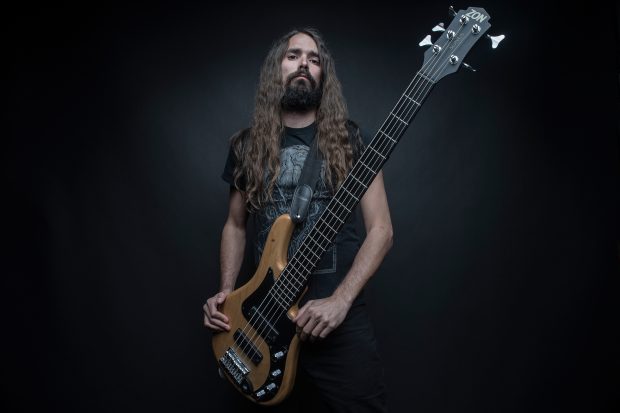
When I had the pleasure of working on a Profiles in Tone interview with metal legend Alex Webster, he sent me a few examples of his favorite bass tones in metal. If I can trust anyone’s ear for metal bass, it’s Alex’s. One clip that particularly caught my ear was a video of a band doing a playthrough of their song “Spastic”. That band was Revocation and that bassist was Brett Bamberger.
Beyond tone, Bamberger has plenty of “T”‘s in his arsenal: time, technique, and taste. They all form to create the backbone of the Revocation’s upcoming album, Great Is Our Sin, due July 22nd. The album is full of crushing riffage from guitarists David Davidson and Dan Gargiulo and the pounding drums of Ash Pearson, but even with each member bringing their all to the table, the bass is not simply relegated to the bottom of the mix. Bamberger’s distinct voice on the instrument lends extra character to the music without losing the emphasis on supporting the song.
The bassist has had plenty of time to develop that voice. Prior to joining Revocation in 2012, he was in Postman Syndrome and East of the Wall, two signed and touring bands that provided opportunities to build creative, melodic bass lines that intertwined through the guitars and drums like an ever-growing vine. In fact, Bamberger has been in and is currently working in several groups, including Publicist UK and River Black. All of the groups function differently: two groups must work remotely from across the globe while the third has traditional band practices. It comes as no sweat to Bamberger, though, as each situation provides different opportunities.
We caught up with Bamberger to get the low down on his journey in tone, the writing and recording process, working remotely, and Great is Our Sin.
How did you get into music and bass?
When I was 13 my sister was pushing for my mother to get me a bass guitar. It happened and I started doing Nirvana covers. I also started writing original music with this group of guys right away. Then I started playing in a band called the Postman Syndrome and we got a deal, so it was like, “Cool, I can do this now.” That was that.
I was checking out your old band East of the Wall, and you’ve got some really melodic stuff going on in there.
Yeah, man. Like I said, we started The Postman Syndrome. We were kids and didn’t know what we were doing, really. When one of the main writing members left, that band got kind of crazy. I started up East of the Wall on the side to be kind of a non-touring band with the old Postman drummer and the guy who had left. We added him because we said, “Yeah, this band isn’t going to tour,” and then that band got signed and we started touring. [laughs]
That was my baby. I hung in on that band for a long time. When I joined Revocation, I had to part ways with those guys. I was the last remaining original member of the band to leave.
I always find that’s weird how bands completely morph.
It was weird because some of the members could tour and some couldn’t. We jammed like five nights a week. We blended two bands together. It was so weird. It definitely morphed.
When I first heard about you, it was when Alex Webster sent me a link to Revocation’s “Spastic” playthrough and mentioned you as a bassist whose tone he liked. How do you think your tone has evolved since you joined the band in 2011?
I had such a hard time dialing in with Revocation. When I came from East of the Wall, I pretty much used a Mesa Boogie V-Twin preamp with a line selector. It gave me a clean and distorted blend in a loop. I brought it into the Revo camp and I couldn’t get it to sit in the mix quite right, because I like a lot of distortion and things like that. So I said, “Eff it, I’m not going to use any pedals.” I just went bass into the amp, but then I found dead spots. My playing style wasn’t dependent on those effects, but the two worked together. So I’d be bottoming out in some parts or I’d notice my right hand would be too hard in places when I played with a pick.
I started digging around a little and found more “state of the art” and current gear. I was messing around more with the SansAmp thing, which I was never a fan of, and eventually a friend got me into Zon basses and got me dialed in with new stuff. From there I went from using a Mesa 400+ to a Taurus solid state amp from Poland, which sounds awesome. It sits so much better in the mix. Then I started using Aguilar effects and Darkglass Electronics effects. Pretty much that’s where I’m at right now.
For the new record, it’s such a different tone than I envisioned from when I started playing bass. I used to want to sound more like a ripping guitar with a lot of distortion; just nasty and ugly. What I learned in my travels is that your low end goes away when you do that. [Great is Our Sin producer] Zeuss and I spent time looping a lot of weird chains together to get a lot of different tonal options. It’s the happiest I’ve ever been with a Revocation record for my bass tone.

I love that tone. It just peeks out at the right amount with a lot of balls.
Yeah. You know, I’m trained fingerstyle, but I started using a pick in East of the Wall. In Revocation I’m going full pick. Sometimes you have to be a little shred-y and I want to be consistent in the live show. If your right hand is fatiguing, you’re going to come out of the PA [sounding bad]. I want the consistency because I like a high energy rock and roll show. I want to move around; I don’t want to sit in one place and really stress out.
I learned recording with my right hand that I had to lighten up my attack a little bit. There are some parts where you just want to beat it up, and you may feel good about it but it will sound like shit. [laughs]
Are you a big practicer? When you found those issues in your playing, did you sit down with exercises to work it out or did you just become more conscious of it and focus on it?
I go through cycles of intense practicing. I keep a very busy schedule with a lot of different bands so my sit down time nowadays is pretty much filled with mixing, writing on guitar and playing some bass. I’ve been getting really into recording, so I guess my practice time now is more sitting behind the console mixing and editing.
Before I do a record, I sit with the tunes for a couple months at probably six hours a day. I just sat with them and figured out the best sounds, the best lines and areas where I wanted to do something a little different. We do the bass last with Revocation, so in the studio I want to be ready to go on anything. I need to know how to play each part four different ways. I want to have three different ideas for each part. It’s usually Dave, Zeuss and myself sitting there while I’m tracking. I’ll throw out ideas or someone will say, “Yo, give me something with a little flavor on this”, and then I have to just whip something up real quick. So I like to be prepared for those recording sessions because there’s a level of spontaneity to it. Also, your execution is on a time frame. You have to get it done.
On the contrary, we did that recording at the beginning of February and then I went at the end of February to do a record with my other band River Black, which Seasons of the Mist is putting out. I put in maybe a week of practice with that because we had been working on those songs for so long. We cut the bass and drums live, pretty much. It was a very different recording process and preparation process, so it depends on the project.
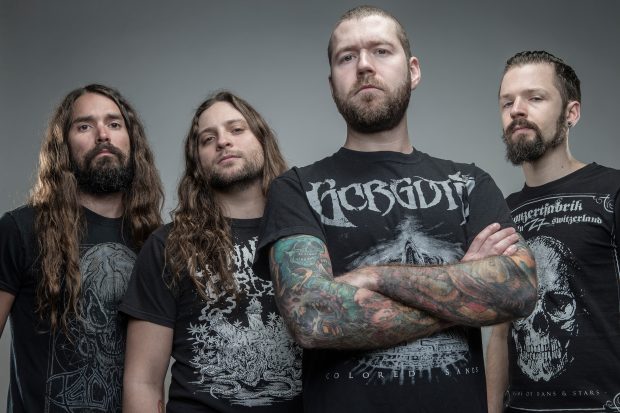
How do you balance working with several bands?
For the band Publicist UK, that’s all written remotely. You’ve got one guy in Denver and one guy and Brooklyn and two of us in Richmond. For my parts on that, I wrote most of them while on tour in Europe. I roll with a mobile recording rig.
River Black is a project that writes in the room, so it’s pretty much whenever John (from Burnt by the Sun) gets down we’ll get together and write in the room. We just finished that album a week and a half a go in New Jersey.
You can only do projects that fit into the mold. We’re doing another basement band here in Virginia that won’t play anything with a stage: only house shows and basements. That’s pretty much just the fun thing where you don’t have to worry about touring and t-shirts and records. You just show up, rip a set, get wasted and have fun [laughs]. We’re trying to recreate the essence of being kids again and the reason that we all started doing music was for those basement shows.
Pretty much you find time for everything the way that it fits in with everything else. Everything takes up a certain piece of real estate in your timeline, if that makes sense. And I’ve got a lovely, supportive lady with me and she’s an artist as well. When she’s sitting on the other side of the room grinding out illustrations, I can be over here working. Then we can say, “Hey, what are you working on?” Some of our quality time is just spent working 10 hours on our projects. It’s just a good balance.
How did the Great is Our Sin come about?
Well, we know our own cycle now. When I joined the band, they were like, “Ok, we have to record this new Scion EP next month.” So I said, “Cool, let’s do it.” After that, it just kind of fell into this good cycle of recording and touring. We’re always kind of working on things even when we’re grinding on tour. David just writes so much, so fast, and so quality. Same with Dan. Since we are spread out, it’s just a matter of sending stuff to each other. We all kind of write and trade ideas, then get in the room maybe twice for preproduction just to feel everything out. That’s pretty much the way we do our records. It came to be a little bit weirder than what we do, but also more cohesive. I think it’s our best effort, and I’m not just saying that because it’s the new record. I truly believe it’s the group’s best effort for sure.
What are the advantages or disadvantages of working remotely?
I see just pure advantage. The only disadvantage is it takes a couple bucks to get us together. That’s the only annoying part. I love working remotely with this group of individuals because everybody does their homework and comes prepared.
When I was doing East of the Wall, it was sometimes three to five nights in the practice space. I’d be working 70 hours and then going to practice and just being shot in the room and not being able to really enjoy it. Now when I get to sit down, it’s without having to drive to practice. I just pull my bass off the wall, put headphones on, and go into it. You have the peace of mind knowing that everybody is doing the same thing. I think it gives you better quality of life as a musician. You get more alone time to really put yourself under the microscope. It’s not as rock and roll as it once was, but it’s more professional in a lot of ways, which is why I’m itching to do that basement thing and just play some shitty rock and roll stuff that doesn’t matter, you know what I mean?
I’m so dialed in to being this certain player and performer, that’s what my life has come to. It’s kind of strange. I didn’t know back when I was a 13 year old kid that I’d be managing money and inventory and time and flights and doing all those things. I’d have been like, “Man, that’s not rock and roll,” but it is rock and roll at the same time.
When you’re writing bass lines, when do you want to follow the riff and when do you want to follow the drums?
I never want to follow either of them, really [laughs]. It’s different. You have to know who you’re working with. When I was doing East of the Wall, I was writing a lot of that and all of the bass lines were supposed to be kind of in between. That’s what I was used to doing because it was all a lot of collaborative effort in the room and spontaneous writing. I kind of have a rough idea of what Dave and Dan want to hear on their songs. Sometimes I’ll be right on the money with that and sometimes I’ll be a little off, but I don’t have an ego or complex. I’ll do whatever is right for the song. That’s the bottom line.
With River Black, we follow the riff straight up. It’s a punishing, heavy, beat-down, New Jersey-style band. It’s got some mean elements so it just needs to have the bass under it with the riff.
I’m more conscious now of the drums than I ever have been. When you’re covering that frequency spectrum, the combination of drum and bass needs to be a good one. That’s something I’ve learned a lot about from working with the Revocation guys. Dave is a very strong composer and he knows what he wants and why it should be that way. He taught me how to be a better rhythm player, for sure, but my natural inclination is still to do my own thing.
There were a couple specific lines I wanted to ask you about on the album. During “Crumbling Imperium”, there’s a killer part where the guitar lightens up and you hold down this blistering riff. Is that a new line or the main riff of the song?
It’s the same riff. When Dave sent over the pre-production tracks for that song, I thought it was interesting. The part I was playing didn’t really work over it, so that’s one of the ones where when we got in the room, they said, “Should we just have the bass rip the line the entire time?” It took me a minute to get it because it’s a tough line. It’s kind of outrageous. I had to sit with it with headphones for a couple days before I was able to come in the room and get the idea down. That was one of the cooler parts of the record and one of the parts we decided on in the room together. It’s a tough riff because it turns around in two weird ways in the left hand that I had to adjust to, but I talked to Dave and I said, “Come on, man, this one has got me shot.” He said, “That one took me a minute, too.” So I said that’s cool [laughs].
The other part that got my ear was the quick fill in “Communion”.
Thanks man. I was sitting at home with that song for a while. Trying to find a tasty thing to do with the Revocation stuff is challenging because there’s so much flash in the guitar work and I’m not a big fan of flashy bass, to be honest with you. I like more dirty bass or mean bass. I still thought it would be a cool place for a riff. At the time I was checking out a lick by Cody Wright. He’s my homey and we rap a little bit here and there… He’s just such a ripping player. So the lick from “Communion” was actually inspired by one of his licks that I was messing around with. When we got into the room we redid it. I came in with that idea and we rewrote it to be this nasty descending fill. It’s actually really easy to play.
(Hear the riff during the breakdown starting at 1:39):
That’s funny. The things that are “easy” usually sound the best.
Totally, and it’s funny that the parts that sound hard are the easiest and the parts that sound easiest are hardest to track right. We came up with the part and got it pretty quick, but there were other parts on the record that were like, “Why am I blowing this?” [laughs].
Anything else you’d like to add?
I’m psyched to hit the road with the album and to see what the fan reaction is to it. I’m just happy to get out at it again because the undying support of everyone kept us moving and gave us this momentum and this opportunity to do what we love doing. Thanks to everyone for the support!

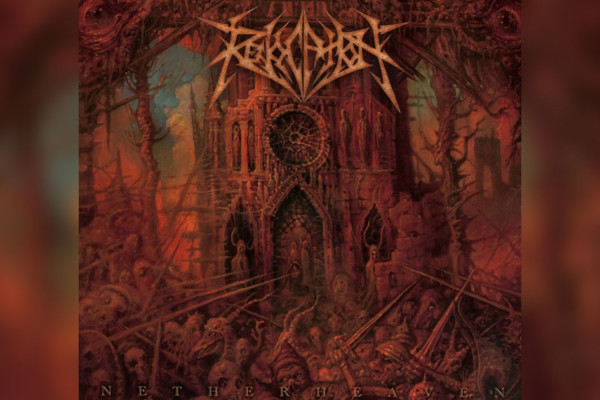
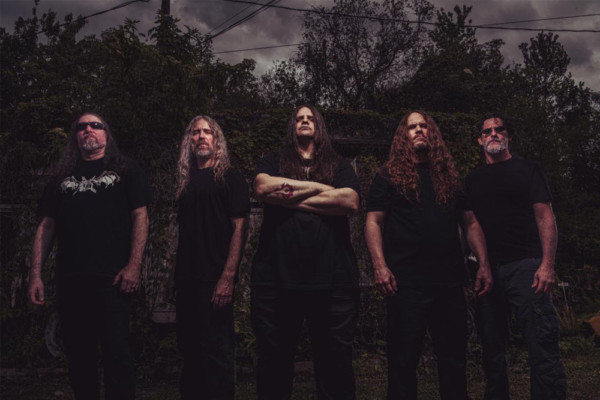
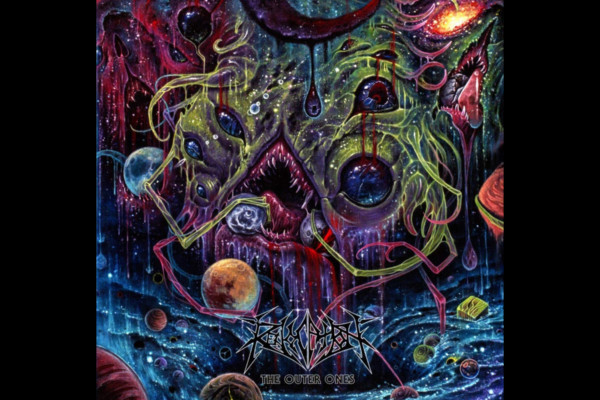
Revocation is the future of heavy metal, and I cannot wait for the new record. \m/